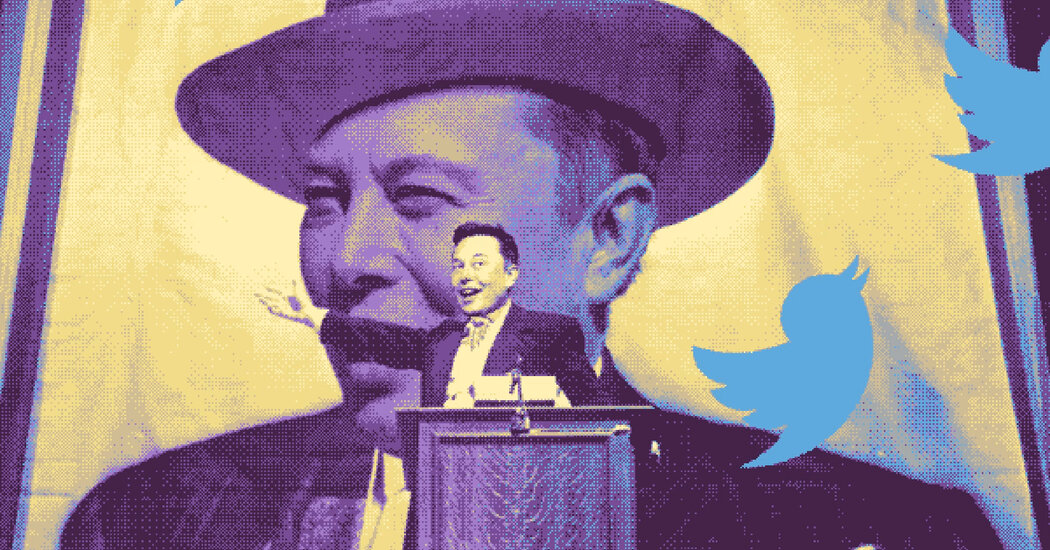
What if one of the world’s important tools for information was owned by a mercurial billionaire who could do whatever he wanted with it?
Yes, I am talking about Elon Musk’s proposal to purchase Twitter for himself, which he disclosed on Thursday. His offer works out to more than $43 billion, which is a lot of money, even for Musk, the chief executive of Tesla and the owner of SpaceX. (Musk’s letter offering to buy Twitter said that his purchase would be conditioned on finding help in paying for the acquisition. It didn’t say where the money might come from.)
Will Musk actually have the cash and attention span to follow through on his proposed acquisition, and will Twitter say yes? Who knows? The word “unpredictable” doesn’t do justice to this moment. We’re already in Week 2 of Musk and Twitter’s very public and rocky romance, and there may be more weirdness to come.
But imagine that Musk eventually buys Twitter from the stockholders who own it today. The closest comparison to this might be the 19th-century newspaper barons like William Randolph Hearst, Joseph Pulitzer and the fictional Charles Foster Kane, who used their papers to pursue their personal agendas, sensationalize world events and harass their enemies.
We have not really had a Citizen Kane of the digital age, but Musk might be it. And Twitter’s global influence is arguably larger and more powerful than that of any Hearst newspaper of its day.
Jeff Bezos’ purchase of The Washington Post and Rupert Murdoch’s news media empire are close, perhaps, but this would be a milestone: A 21st-century tech baron’s purchase of a digital platform of global importance, with the purpose of recasting it in his image.
“He would be a throwback to the ‘Citizen Kane’ days of press barons using their newspapers to advance their favorite causes,” Erik Gordon, a professor at the University of Michigan’s business school, told me.
Musk’s favorite idea is a Twitter that operates the way he uses Twitter: no holds barred. He imagines a social network transformed, by him, into a paragon of expression without theoretical limits.
It’s basically the same pitch that former President Donald J. Trump has for his app, Truth Social. Several other social media sites also promised to build internet gatherings without the arbitrary rules imposed by companies like Twitter, Google and Facebook. But those sites remain relatively small and unimportant compared with Twitter.
Musk’s proposed purchase of Twitter, then, would amount to a real-world experiment in a parallel social media app without restrictions on what people can do or say. I don’t know what this would look like when applied.
Truth Social does not permit absolute free expression. Few people want to have their social media feeds clogged by spammy advertisements for cryptocurrency, terrorist recruitment pitches or harassment of children. No one is sure what a Twitter that is accountable to no one but Musk would be like. (One intriguing question: Would Musk restore Trump’s Twitter account?)
I also wonder if Musk actually wants to own Twitter. It’s fun to imagine what you’d do if you were the boss of Twitter, but it’s not so fun actually being the boss of Twitter. Look at Mark Zuckerberg running Facebook. That guy does not seem like he’s having fun.
“My guess is that Musk enjoys being able to tell Twitter what to do and does not care very much about it actually getting done,” the Bloomberg Opinion writer Matt Levine said Tuesday in an eerily prescient column.
If Twitter were solely owned by Musk, he wouldn’t have to worry about the vagaries of a stock price or shareholders’ demands, as Zuckerberg does. But that doesn’t mean Musk would be free from irritations.
When you own a powerful internet site, you might be on the receiving end of threats from the Russian government to imprison your employees over posts they don’t like or a family member asking why a stalker is allowed to harass them in their private messages. Musk might not want to deal with the ugly details of owning a tool of global influence, but he wouldn’t have a choice if he were Twitter’s sole proprietor.
I want us to save a small measure of pity for the executives and directors of Twitter. They are in an impossible situation. (The company said that its board would “carefully review” Musk’s proposal and decide what it believes is in the best interests of Twitter and its stockholders.)
Twitter’s board of directors could agree to Musk’s offer, and he could decide that finding the cash to buy Twitter and turn it into an imagined free-speech haven is not a great use of his money, time and energy. Then, Twitter would have a worthless acquisition offer, the company’s share price would most likely tank, and angry stockholders would probably sue the board.
Twitter’s board could say no to Musk on the theory that the company has a long-term plan that would make it far more valuable than what Musk is offering. In that case, Musk has said, he might sell the billions of dollars in Twitter shares that he recently bought. Twitter’s stock price would most likely tank, and angry stockholders would probably sue the board.
Twitter’s relatively new chief executive, Parag Agrawal, might prefer to yank out his toenails than to deal with weeks of messy drama over Musk. Maybe it’s not great for Musk, either, to continue engaging in messy drama over Twitter — although … OK, that is what he does in his leisure time.
What if Musk achieves what he thinks he wants? I won’t spoil the movie “Citizen Kane” if you haven’t seen it, but here is the short version: Kane achieved his wildest dreams, and he was miserable.
If you don’t already get this newsletter in your inbox, please sign up here.
Before we go …
-
Good luck delivering Doritos in 30 minutes or less: My colleague Erin Woo writes about GoPuff, a start-up that kicked off the recent frenzy of services that operate tiny urban warehouses and promise to bring convenience-store items to people’s doors in 30 minutes or less. GoPuff believes that it has vanquished the ghosts of Webvan and other companies that went broke trying to deliver fresh food to Americans. We’ll see.
-
You need to share your W-2 and relinquish your privacy: The Washington Post reports on the personal information that you might be asked to hand over to the tax-filing websites TurboTax and H&R Block, and how to say no to what are essentially demands for personal information to upsell you on other products or serve ads. (A subscription may be required.)
-
Call your agent (the agent is TikTok): TikTok has become a way for music to find a big audience. But Rest of World writes that the app’s parent company, ByteDance, also has a side gig in Brazil and Indonesia to discover new musicians and distribute and promote their work — similar to what conventional music labels do.
Hugs to this
The best animal security-camera footage is a wayward duck. (Turn the sound on for maximum impact.)




